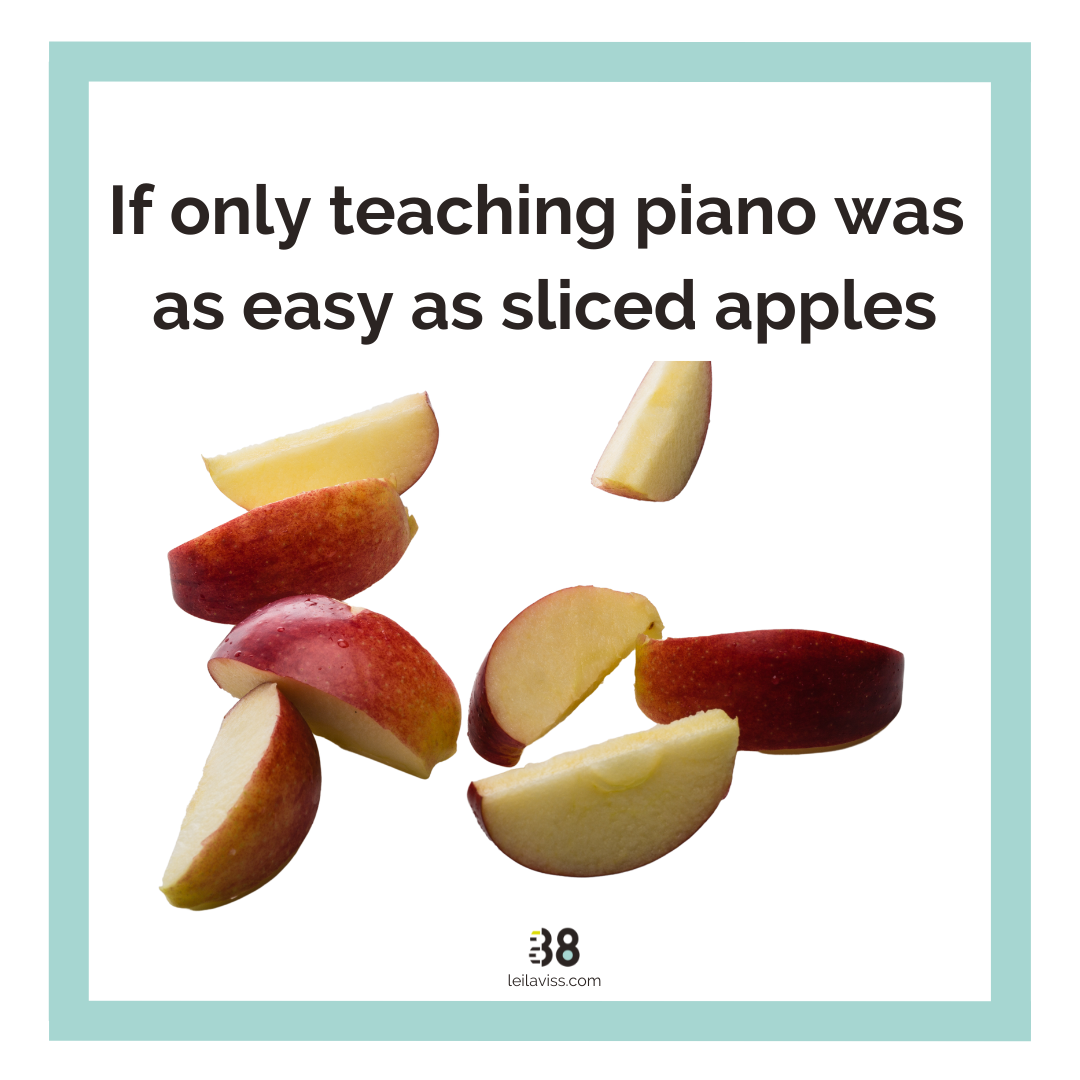If only teaching piano was as easy as sliced apples!
A study shows that kids are 70% more likely to eat an apple if it is sliced and placed in a plastic bag. Yes, merely slicing up apples greatly increased apple consumption of kids by SEVENTY PERCENT!
That's because they made it easy, says economist, Richard Thaler and Cass Sunstein. Thaler says...
If you want to encourage people to do something, make it easy.
Tweaking the way a choice is framed can change a person's decision. This is called "nudge."
Small changes in the words we use or the way we think can have a huge impact on behavior and outcomes.
-Guy Raz
Check out this podcast
I first learned of this fascinating fact in an NPR TED Radio Hour Podcast titled "Nudge" hosted by Guy Raz. Pause and listen to it now or keep reading to learn how the podcast connects to teaching piano and make sure to listen to it later!
How does this connect to piano lessons?
The podcast got me thinking. Wouldn't it be cool if students (of any age!) were 70% more likely to start and stick with piano lessons if things were sliced up and packaged a little differently to make them easy? What would these "slices" look like?
Personally, I'm much more inclined to eat an apple if it's been cut up first. If small changes in how things are packaged impacts my behavior, how can small changes implemented by teachers in piano lessons impact the behavior of students?
This idea of "repackaging" piano lessons so that they are easier and help to nudge more into taking and sticking with lessons seems logical, but...
I've never liked the word "easy" associated with piano lessons. There's nothing easy about learning a musical instrument. It takes years of dedication and practice to become a sufficient player!
So...what does "easier" look like in the piano studio?
After pondering this question, it became apparent that the answer to making things easier in the typical piano studio is best addressed by looking closely at the roles of
the teacher
the student
and the parent.
I brainstormed the following suggestions and would appreciate your input on what could be added to each one!
How can teachers make piano easier for students?
If assignments are too big to bite off in a week, students will avoid them. There's a name for that behavior; it's called "approach avoidance." I bet you suffer from it at times, too!
So, make sure to provide weekly assignments that provide clear expectations and that can be accomplished with relative success before the next lesson. Here are some tips on how to do just this.
Provide clear lesson notes with specific goals.
Set attainable goals that can be reached before the next lesson.
Mark each piece to be practiced with a colored tab so students can quickly find the page to practice. Declare a studio-wide color for the week so that students know exactly what to practice.
Use arrows to remind students of tricky parts.
Demonstrate effective practice strategies during the lessons so students know how to use them at home.
Slice up repertoire into pieces and set clear boundaries for goals to reach between lessons with post-it notes.
Give concrete tools to aid practice and show visual evidence of progress. Learn more about practice pouches and practice tools here.
Share creative tips in little bits. For example, ask students to choose a favorite mastered piece and invite them to change one element like play an octave higher or use staccato instead of legato. Add a sense of random adventure by creating a wheel in the Decide Now app and spin the app to determine what to change.
Read more about all of these tips and how to make practice "easy" in A Piano Teacher's Planning Kit.
A planning resource you’ll value and reference for years to come.
Get a complimentary copy of “Technical Difficulties Made Easier” with your purchase!
How can teachers make piano easy for parents?
Add Off-Bench time so siblings can come to lessons at the same time and for 60 minutes instead of 30 minutes. Learn more about how to add Off-Bench time to your lessons here.
Set high expectations, then remember what it's like to be a parent. Understand that some weeks practice will not/can not be a priority.
Offer flexible payment plans that include credit cards. Consider using a platform like My Music Staff or Coinhop or Fons so you can accept credit card payments.
At recitals, reserve a photo opp chair for a parent or the whole family so that when their child performs, they have a clear view for taking videos and photos.
Communicate clearly and frequently. If parents are not responding to your emails, etc. perhaps you send them too frequently, too little, or they are too wordy with bloated paragraphs. Be concise, and to the point, and use bullet points as much as possible. Parents get all kinds of emails and will scan instead of read so BIFF them:
B = Brief
I = Informative
F = Friendly
F = Firm
How can parents make piano easier for students and teachers?
Read lesson notes immediately after the lesson.
Place books on the piano open to the page to be practiced and leave them open all week.
Ask about practice strategies and listen for mindful repetitions.
Encourage drive-by practice to avoid practice fatigue. Learn more about the six scientific ways to practice here.
Ask to hear every assigned piece and choose a favorite.
Pay tuition promptly so the teacher's time is not wasted on collecting unpaid tuition and can be used to plan lessons and find repertoire.
How can students make piano easier for teachers and parents?
Read and follow the lesson notes before practice begins.
Practice at least five times each day around the same time or break it up between activities.
Keep track of practice with a pill box. Pack a pill box with a favorite treat. If practice happens on that day, eat the treat, if not, no treat!
Use the practice strategies modeled in the piano lesson by the teacher.
Be curious and ask why as much as possible.
Come to lessons with questions when something is difficult to understand.
Let the teacher know of your favorite pieces that you can't wait to play.
What if "easy" is still hard?
All these sliced-up tactics can help ease the process of learning the piano but, it's still not an easy skill to attain and unlike what today's society is addicted to, it doesn't offer instant gratification. Gratification comes with hard work, determination, a certain mindset and grit.
Grit is the combination of skill AND effort.
-Angela Duckworth
A growth mindset (unlike a fixed mindset) is essential for grit to kick in. The Ted Hour "Nudge" Podcast includes an interview with Carol Dweck, author of Mindset: The New Psychology of Success and digs into how we can grow our brain's capacity to learn and to solve problems--called a growth mindset.
About a year ago, I posted a blog about grit inspired by Angela Duckworth's research. It's been a theme in my studio as well as fellow teacher Marie Lee. She even created t-shirts and water bottles for her students! Read the post here.
To help your students understand what grit looks like and to cultivate a growth mindset, take a look at this Get Inspired! Episode packed with videos of musicians with grit.
What does nudging look like in the piano studio?
The idea of nudging or impacting the behavior of students includes a well-balanced combination of:
Big-apple challenges sliced into attainable, easy-to-swallow tasks for students, teachers and parents
Students empowered with a can-do attitude
An environment that generates grit.
Let me know if you listen to the podcast and have additional ideas to share.
Here's to nudging your students in the right direction: back to the piano bench for more practice!







